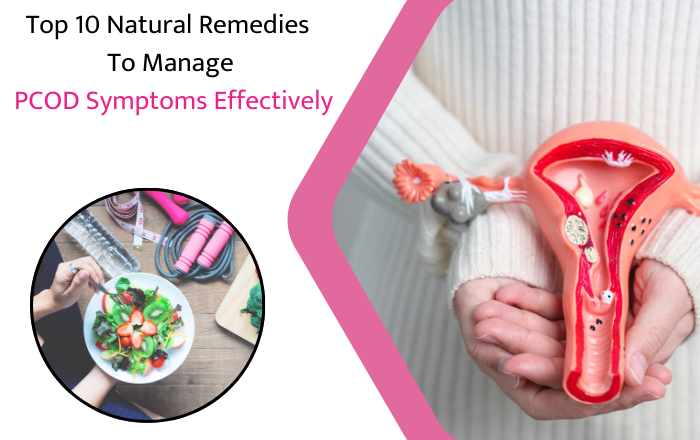Polycystic Ovarian Disease (PCOD) is a common condition affecting many women worldwide. It brings challenges like irregular periods, weight gain, acne, and hormonal imbalances, often making daily life difficult. While medical treatment is crucial in severe cases, many women are exploring natural ways to manage PCOD symptoms at home. Incorporating these remedies into your lifestyle can help improve your health and provide long-term benefits.
In this article, we’ll walk you through the top 10 natural remedies for managing PCOD effectively. These tips focus on improving your overall health and helping you regain hormonal balance.
What is PCOD?
PCOD is a hormonal disorder where the ovaries produce an excess of male hormones, leading to irregular menstrual cycles and other symptoms. Women with PCOD often develop multiple small cysts in their ovaries.
Common symptoms of PCOD include:
- Irregular or missed periods
- Excessive hair growth (hirsutism)
- Acne and oily skin
- Weight gain, especially around the abdomen
- Difficulty conceiving
- Hair thinning or hair loss
Understanding your symptoms is the first step in managing PCOD. While lifestyle changes may not completely cure PCOD, they can significantly reduce its impact on your life.
Why Consider Natural Remedies for PCOD?
Natural remedies focus on improving hormonal health, managing weight, and reducing symptoms without relying on medications. They often involve sustainable lifestyle changes, which can make a big difference when managing PCOD long-term. These remedies aim to address the root causes of PCOD, such as insulin resistance and inflammation, helping you feel better naturally.
Top 10 Natural Remedies to Manage PCOD Symptoms
1. Balanced Diet
A healthy diet plays a critical role in managing PCOD. Focus on eating whole, nutrient-dense foods.
Include: High-fiber vegetables, lean proteins, healthy fats (avocado, nuts, seeds), and low-GI (glycemic index) foods like quinoa and legumes.
Avoid: Processed carbs, sugary drinks, and trans fats.
Eating smaller, balanced meals throughout the day can also help regulate blood sugar levels, reducing insulin resistance—a common issue in PCOD.
2. Regular Exercise
Physical activity helps manage weight, improve mood, and reduce insulin resistance. Aim for at least 30 minutes of moderate exercise five times a week.
Best activities: Walking, jogging, yoga, swimming, and strength training.
Exercise also reduces stress, which can significantly improve PCOD symptoms over time.
3. Herbal Supplements
Certain herbs can help regulate hormones and reduce PCOD symptoms. For example:
Fenugreek: Improves insulin sensitivity and aids in weight management.
Cinnamon: Helps regulate menstrual cycles by stabilizing blood sugar.
Spearmint Tea: Reduces excessive hair growth and promotes hormonal balance.
Before trying herbal supplements, consult a trusted healthcare professional to ensure safety.
4. Stress Management Techniques
Stress plays a significant role in worsening PCOD symptoms. Elevated stress hormones, like cortisol, can disrupt your hormonal balance further.
Techniques to try: Meditation, deep breathing exercises, journaling, or engaging in hobbies you enjoy.
Even taking 10–15 minutes daily for relaxation can make a noticeable difference.
5. Adequate Sleep
Poor sleep can worsen hormonal imbalances and increase cravings, contributing to weight gain. Aim for 7–9 hours of quality sleep each night.
Tips for better sleep: Create a consistent bedtime routine, avoid screens before bed, and keep your sleeping area dark and quiet.
6. Hydration
Drinking enough water supports metabolism, improves digestion, and helps eliminate toxins that can affect hormonal health. Aim for at least 8–10 glasses of water daily. Adding detoxifying ingredients like lemon or mint can provide extra benefits.
7. Apple Cider Vinegar (ACV)
Apple cider vinegar is known for its ability to regulate blood sugar levels and improve insulin sensitivity.
How to use: Mix 1–2 tablespoons of ACV with a glass of water and drink it before meals.
ACV may also aid in weight management, further reducing PCOD symptoms.
8. Vitamin D and Sunlight
Many women with PCOD have Vitamin D deficiency, which can worsen symptoms. Spending 15–20 minutes in the morning sunlight or taking Vitamin D-rich foods like fatty fish and fortified dairy can help. Supplements may be necessary if you’re severely deficient.
9. Ayurvedic Treatments and Home Remedies
Ayurvedic remedies focus on balancing hormones naturally.
Shatavari: Supports reproductive health and improves menstrual cycles.
Ashwagandha: Reduces stress and balances cortisol levels.
Turmeric: Anti-inflammatory properties help with symptoms like bloating and pain.
10. Maintaining a Healthy Weight
Excess weight can exacerbate PCOD symptoms, particularly insulin resistance.
Focus on gradual and sustainable weight loss through a combination of diet and exercise.
Even a 5–10% reduction in body weight can significantly improve symptoms like irregular periods and ovulation.
When to Consult a Gynecologist for PCOD
Although natural remedies can be very effective, some symptoms may require medical attention. Consult a gynecologist if:
- Your periods are absent for more than three months.
- You experience severe abdominal pain.
- Fertility concerns arise, or you’re planning to conceive.
Seeking advice early can prevent complications and allow for better management.
Dr. Manisha Kulkarni: Gynecologist in Magarpatta
Dr. Manisha Kulkarni is a trusted gynecologist specializing in PCOD treatment in Magarpatta. With her extensive experience, she can provide valuable guidance to help you manage PCOD effectively. A consultation with Dr. Kulkarni can clarify your symptoms and ensure you’re taking the right steps for your health.
FAQs
1. What are the most effective natural remedies for PCOD?
A balanced diet, regular exercise, and stress management are among the most effective remedies.
2. Can PCOD be managed without medication?
While natural remedies can help manage symptoms, some cases may require medical treatment.
3. How does weight loss improve PCOD symptoms?
Weight loss reduces insulin resistance and balances hormones, which can improve symptoms like irregular periods.
4. What foods should I avoid if I have PCOD?
Avoid processed carbs, sugary foods, and trans fats, as they worsen insulin resistance.
5. Is yoga effective in managing PCOD symptoms?
Yes, yoga helps reduce stress, improve hormonal balance, and support overall health.
PCOD can be challenging, but by adopting these natural remedies, you can take control of your symptoms and lead a healthier life. Incorporate small changes into your daily routine, such as eating a balanced diet, staying active, and managing stress. These steps can significantly improve your hormonal health and overall well-being.
If you’re looking for professional guidance to address your PCOD symptoms, consider visiting Dr. Manisha Kulkarni in Magarpatta. Her expertise can help you navigate your condition with confidence.


